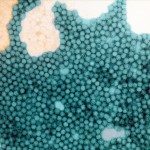Link to Pubmed [PMID] – 14500123
J. Virol. Methods 2003 Oct;113(1):19-28
The identification of cell types replicating dengue viruses is an important step towards the understanding of the pathophysiology of dengue severe forms. Since the detection of negative strand viral RNAs is the more reliable marker of active replication for single-strand positive sense RNA viruses, we reassessed the specificity of RT-PCR assays already developed to detect dengue negative strand RNAs. Studying mammalian Vero cells infected by a dengue-2 strain, it was shown that falsely-primed cDNAs are generated in vitro during the reverse transcription step and are amplified subsequently by PCR. Since this may compromise the specificity of existing RT-PCR systems, we developed a tagged RT-PCR assay and addressed the role of some critical factors in such a system. Optimization of the negative strand-specific tagged RT-PCR allowed to resolve the problems due to the PCR amplification of falsely-primed cDNAs. Using this assay it was possible to detect specifically negative strand RNAs as soon as 3h after Vero cells have been exposed to the dengue-2 strain and we showed that this system is highly specific. Thus, the present dengue negative strand-specific tagged RT-PCR assay may help to reassess viral replication in the context of dengue pathophysiology.

